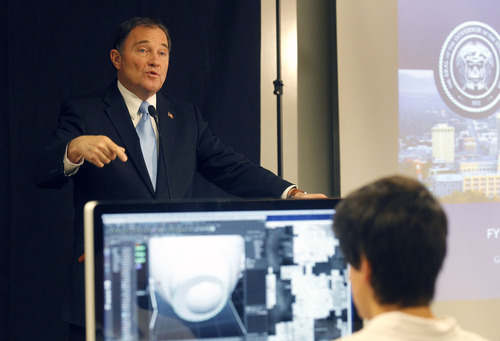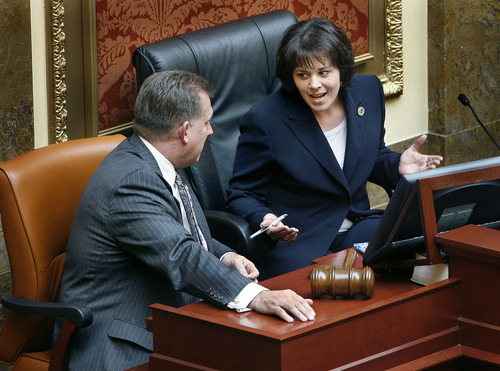This is an archived article that was published on sltrib.com in 2014, and information in the article may be outdated. It is provided only for personal research purposes and may not be reprinted.
A doomed proposal to spend hundreds of millions of dollars on school technology stole most of the education spotlight this legislative session.
Legislators sparred over House Speaker Rebecca Lockhart's massive proposal, eventually failing to fund it. Gov. Gary Herbert said Thursday evening that a technology initiative will be back next year. "It didn't start with the speaker and it won't end with the speaker."
Meanwhile, lawmakers passed dozens of other education bills and a mostly crowd-pleasing budget.
Lawmakers decided to spend $65 million to fund an additional 10,300 students expected in Utah schools this fall. And they opted to put another $62.5 million toward upping basic per pupil spending next school year, a 2.5 percent boost — though much of that will likely go toward health insurance and retirement cost increases.
State Superintendent Martell Menlove said Thursday that things went "well" for education, though he noted the state school board had hoped for a 2.7 percent increase in per pupil funding.
"We hope a 2.5 percent increase will allow for some additional flexibility for districts and charters," he said, though he added, "that's not a lot of new money."
HB96, a preschool bill that passed, also was a high priority of the board, he said. It aims to award grants for high quality preschool curriculum for at-risk kids. Private investors would fund it, and the state would pay them back only if it proved successful.
Also, Sen. Stuart Reid's SB43 will give schools $1 million for after-school programs focusing on impoverished children. Reid, an Ogden Republican, wanted $5 million.
Lawmakers also passed HB286, requiring the development of a school program to teach kids about sexual abuse. That bill passed after testimony from Elizabeth Smart and several senators who revealed their own stories of sexual abuse on the Senate floor.
The STEM Action Center in the Governor's Office of Economic Development got one of the larger education-related infusions: $20 million, $15 million of it one-time money, It helps schools boost science, technology, engineering and math education.
Sen. Aaron Osmond's early hopes for sweeping changes in how schools and parents relate came down to more modest, but successful bills, including SB122, which give parents a bill of rights and responsibilities. The South Jordan Republican's SB39 also passed, giving home school families more autonomy, and SB103 gave school boards the right to use four school days for teacher professional development.
Sen. Stuart Adams' SB209 also passed, changing the state's school grading system, exempting alternative schools and no longer giving automatic failing grades to schools where fewer than 95 percent of students are tested, dropping those schools one letter grade only.
Sen. Patricia Jones, D-Holladay, grabbed attention for her proposal to limit personal tax exemptions, which ultimately failed but would have raised big families' income taxes to pay for schools.
The Legislature also passed:
HB23, which will let teachers, resource officers and others ask a student questions about the student's suicidal thoughts, self-harming behavior, or thoughts of harming others. Schools still will have to contact the student's parents or guardians under the bill, sponsored by Rep. Steve Eliason, R-Sandy.
SB104, which gives the University of Utah Reading Clinic $100,000 to expand. The clinic works directly with children who have trouble learning. Sponsor Sen. Aaron Osmond, R-South Jordan, initially wanted nearly $1 million to expand the clinic to Weber and Iron counties.
HB342, sponsored by Rep. Dana Layton, R-Orem. It requires the State Board of Education to set up a standards review committee to review any changes in the Utah Core Curriculum. Any changes in the core would have to be publicized for at least 90 days and would be subject to three public hearings around the state.
SB257, sponsored by Sen. Howard Stephenson, R-Draper. It expands the job of the parent committee that reviews computer adaptive test questions for the State Office of Education to include all parent complaints about any school's curriculum or instructional materials. The State Board of Ed will have to publish on its website a report about such complaints.
HB399, which tells school boards they can't issue a habitual truancy citation to a student 16 years and older if he or she has a grade point average of 3.5 or better. It was sponsored by Rep. Francis Gibson, R-Mapleton.







